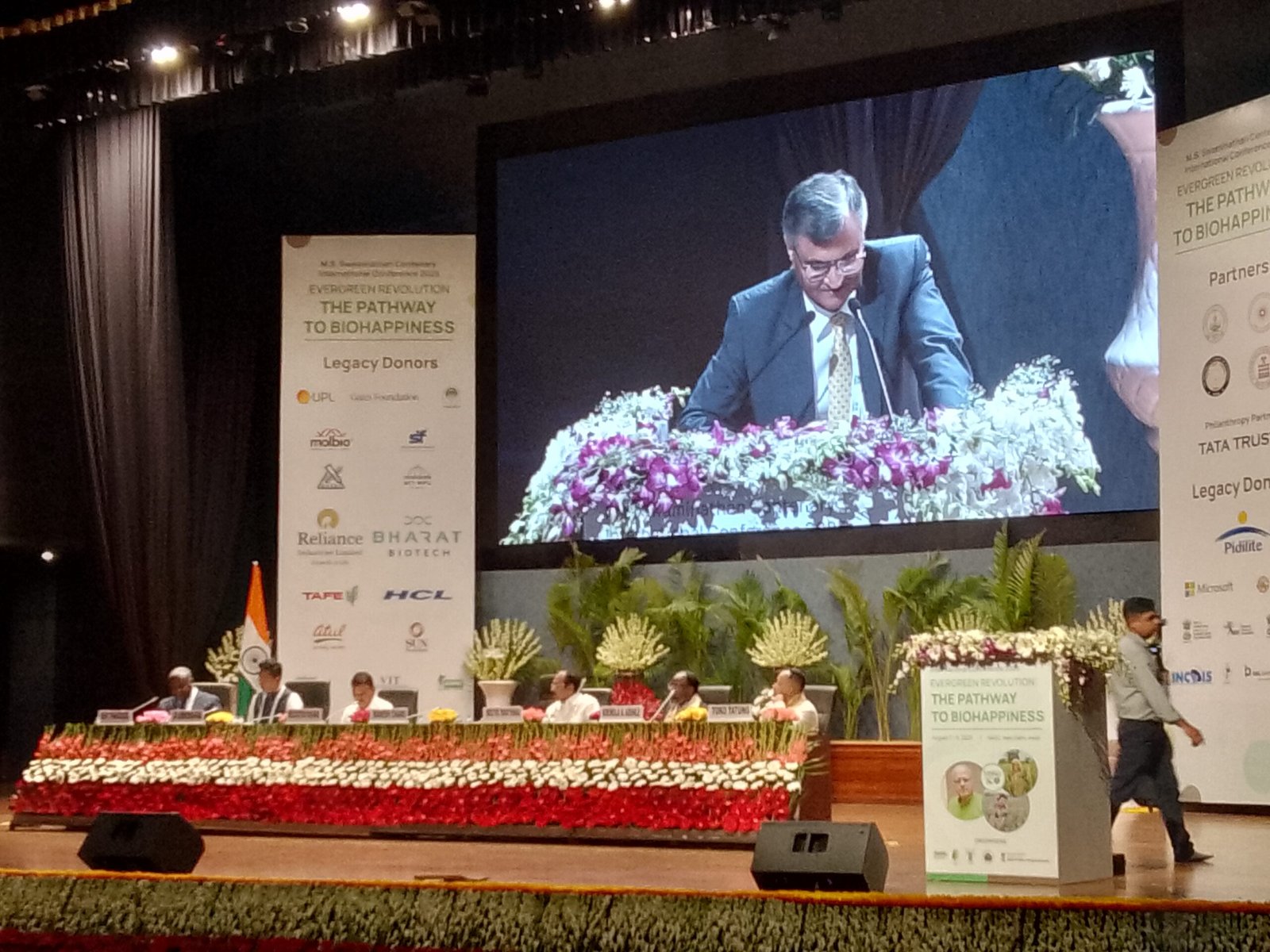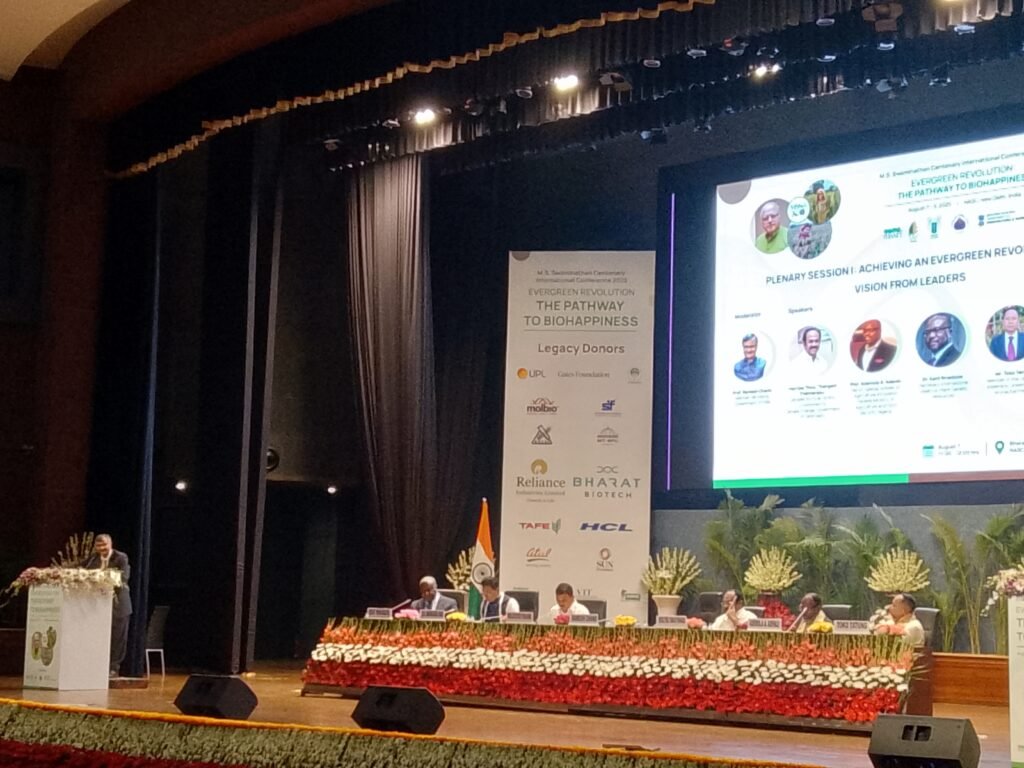Monday, 2 February 2026

In a world beset by ecological fragility, nutritional inequity, and the spectre of climate uncertainty, it is both rare and reassuring to find a figure whose life’s work offers not merely solutions, but a philosophy—a philosophical compass that steers policy, science, and society alike. Such was the legacy of Prof. M.S. Swaminathan, a name that has transcended disciplinary confines and national boundaries to become a synonym for sustainable transformation.
At a seminal gathering in New Delhi—appropriately titled “Achieving Evergreen Revolution – Vision from Leaders”—eminent policymakers, international dignitaries, and agrarian thinkers coalesced to honour the colossal intellect and humanitarian spirit of the man often hailed as the Sage of Sustainable Agriculture. What emerged was not simply a commemoration of his contributions, but a renewed commitment to the ideals he so presciently championed—equity, ecology, and ethical innovation.
Prof. Ramesh Chand, Member of NITI Aayog and one of India’s foremost agricultural economists, cast Swaminathan as a far-sighted seer who not only altered the arc of India’s agricultural productivity but anticipated the perils of ecological overshoot with a clarity that now seems almost prophetic. He spoke of how Swaminathan’s vision encompassed both Gross National Product and what he evocatively termed “Gross Natural Product”—a paradigm where economic development is inextricably intertwined with environmental preservation. Concepts that were once considered peripheral—millets, bioinputs, traditional seed conservation—are now mainstream policy mantras, proving once again that the world catches up with its visionaries, albeit belatedly.

India’s current 4.5 per cent agricultural growth rate and its recent surpassing of China on key agri-indicators, Chand argued, are no coincidence. They are the dividends of Dr. Swaminathan’s insistence on coupling science with sustainability. He pointed to the maize-producing prowess of Tamil Nadu and Andhra Pradesh, where productivity has soared to 7 tonnes per hectare, contributing a remarkable 9 per cent of national output, as examples of regionally rooted yet globally relevant success.
From the southern bastion of Tamil Nadu, Minister for Finance and Environment, Climate Change, Thiru Thangam Thenarasu offered a lyrical yet data-rich reflection. Evoking the mythic Kalpavriksha—the wish-fulfilling tree—as a metaphor for the Indian farmer, he underscored how Swaminathan redefined agriculture not merely as an economic activity but as a vehicle for justice, nutrition, and planetary stewardship. Citing initiatives such as the Hunger-Free Area Program and the Tamil Nadu Biotechnology Policy, he portrayed a state unflinchingly aligned with Dr. Swaminathan’ian’s ideals. With 151 lakh acres under cultivation in 2024 and 50 lakh farms supported under the Integrated Agriculture Development Program, Tamil Nadu is walking the talk. Its pivot toward organic farming, climate-resilient practices, and fiscal incentives for water-intensive crops like sugarcane and paddy reflects a nuanced balancing of productivity with prudence.
From the western corridor of Maharashtra, Agriculture Minister Dattatray Vithoba Bharne invoked Swaminathan as a “beacon of light” who continues to illuminate India’s agri-policy architecture. The state’s ambitious investments in horticulture, digital agri-applications, and AI-powered innovations illustrate how Swaminathan’s vision has been reimagined through 21st-century tools—placing technology, quite literally, in the palms of smallholder farmers.
Toko Tatung, MLA from Arunachal Pradesh, articulated a message that was equal parts tribute and testament. Channeling the voice of his state’s Chief Minister, he reminded the audience that for communities steeped in indigenous knowledge, the ethos of living in harmony with nature is not newly acquired wisdom but ancient inheritance. Arunachal Pradesh, home to India’s largest kiwi cultivation, is now poised to host the country’s first Centre of Biohappiness—a concept so distinctively Swaminathanian that it could be trademarked in his name. With 1.05 lakh hectares under irrigation and a heritage of bio-cultural symbiosis, the state embodies the very fusion of ecology and economy that Swaminathan held sacrosanct. “Biohappiness,” Tatung declared with quiet pride, “is not a slogan—it’s in our DNA.”
International voices lent gravitas to the occasion. Prof. Ademola A. Adenele Senior Special Adviser on Agricultural Innovation, Federal Ministry of Agriculture and Food Security, Nigeria —recent recipient of the inaugural M.S. Swaminathan Global Award for Food Security and Peace—reflected on the necessity of co-creating technologies with communities, ensuring they are not just adopted but owned. His work exemplifies Prof. Swaminathan’s fundamental principle: that science, to be transformative, must be participatory.
Kent Nnadozie, Secretary, International Treaty on Plant Genetic Resources, elevated the conversation to the juridical plane. It was Dr. Swaminathan’s pioneering work, he reminded the assembly, that laid the intellectual foundation for the global farmers’ rights movement. To truly honour his legacy, the world must now transition from extractive to regenerative agriculture—an ethos that feeds not just the body, but the biosphere.
Dr. Srinivasan, bringing the curtains down with characteristic eloquence, wove together the session’s disparate threads—from Tamil Nadu’s red rice varieties to Maharashtra’s rainfed strategies, and Arunachal’s bio-cultural resilience. The enduring takeaway, he asserted, was that Swaminathan’s vision was not parochial but planetary. In his worldview, agriculture was not simply about growing food—it was about growing societies, nurturing ecologies, and dignifying the lives of those whose labour sustains us all.
In an era where the world desperately seeks sustainable blueprints for development, Prof. M.S. Swaminathan’s life work stands as both lighthouse and lodestar. His was a mind that fertilised policy, a heart that beat for farmers, and a soul that never ceased to believe that science, wielded with compassion, could indeed redeem the world.